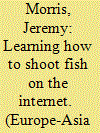| Srl | Item |
| 1 |
ID:
114955


|
|
|
|
|
| Publication |
2012.
|
| Summary/Abstract |
This essay examines regimes of internet use, and the significance of the internet for everyday lives, in the Russian margins. The field site, a small provincial town in European Russia, was visited in 2009 and 2010. Informants were mainly families dependent on a single non-professional wage. Research materials-semi-structured interviews and participant observation-comprising an ethnography of internet use, are supplemented by survey data. Qualitative social research on new media use has critically examined technologically determinist assumptions about social effects of the internet, including the so-called 'digital divide'. The present research also seeks a contextualised understanding of new media use by considering how it is embedded in established everyday social settings and practices. The ethnographic materials and survey data collected indicate that Woolgar's rules of virtuality hold true in the Russian margins: use of new media depends on the local social context and supplements, rather than replaces real activities. Most users in the group surveyed are highly instrumentalist and have little interest in the communicative and non-grounded aspects of the media. At the same time the impetus for initial access to the internet is closely related to issues of esteem and peer recognition within a social network rather than actual need.
|
|
|
|
|
|
|
|
|
|
|
|
|
|
|
|
| 2 |
ID:
114945


|
|
|
| 3 |
ID:
169614


|
|
|
|
|
| Summary/Abstract |
[T]he bureaucracy seeks ways to enrich itself in the manner of one big state corporation, and everyone else finds themselves in positions of vulnerability or dependency.” Second in a series on ways of governing.
|
|
|
|
|
|
|
|
|
|
|
|
|
|
|
|
| 4 |
ID:
180492


|
|
|
|
|
| Summary/Abstract |
Framing the ‘conservative turn’ in Russia as a ‘culture war’ casts ordinary Russians as an amorphous reactionary mass, willingly following political entrepreneurs’ cues of intolerance. This essay rejects that interpretation and seeks to restore agency to ordinary Russians. Based on ethnographic encounters discussing homophobia and heteronormative gender and family attitudes, the essay argues that vernacular social conservatism re-appropriates official discourses to express Russians’ feelings towards their own state. Intolerance is less fuelled by elite cues but rather reflects domestic resentment towards, and fear of, the punitive power of the state, along with nostalgia for an idealised version of moral socialisation under socialism.
|
|
|
|
|
|
|
|
|
|
|
|
|
|
|
|
| 5 |
ID:
187618


|
|
|
|
|
| Summary/Abstract |
Apart from some protests, most ordinary Russians have not overtly opposed their country’s invasion of Ukraine, but nor do they appear to support it enthusiastically. Long-term ethnographic research in the country suggests that Russians have entered a phase of “defensive consolidation,” a psychological means of coping with a state that does little for their welfare and has now left the country largely isolated with its military aggression against its closest neighbor. In the search for lost collective purpose since the collapse of the Soviet Union, patriotism is imbued with nostalgia and desperation.
|
|
|
|
|
|
|
|
|
|
|
|
|
|
|
|
| 6 |
ID:
150338


|
|
|
|
|
| Summary/Abstract |
“Workers form the exemplary class of economic, social, and psychological ‘losers’ of the postcommunist transition.” Second in a series on labor relations around the world.
|
|
|
|
|
|
|
|
|
|
|
|
|
|
|
|